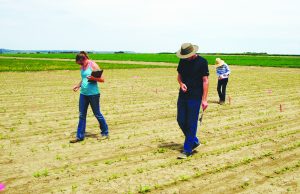Originally published in the 6/15/18 print edition of Yellowstone County News.

Molly Krum, Tanner Steorts and Valerie Smith count established seedlings in sugar beet research trials. (Courtesy photos)
HUNTLEY — Agricultural commodity prices are down. Profit margins are slim. And “research is not a free thing.”
But ag research is a key to keeping farming profitable as plant varieties and farming techniques evolve.
To help growers stay ahead, every other year, the Southern Agricultural Research Center at Huntley offers a field day to give anyone who wants to come a firsthand look at the projects underway at the 462-acre facility operated by Montana State University.
This year’s Field Day Tours are Tuesday. Everyone is welcome.
“I would hope people would want to come and see where your tax dollars are going,” said SARC superintendent Ken Kephart. “Enjoy the company of your friends and neighbors at the very least.”
Registration begins at 2:30 p.m. at SARC, which is 3.5 miles east of Huntley just off Highway 312.Tours are offered on both irrigated and dryland field trials. The first set of tours begins at 3 p.m. A free dinner of steak, burgers or brats is served by the Billings Chamber of Commerce Ag Committee from 5 to 6 p.m., followed by a second round of tours that begins at 6 p.m.
The same set of tours is offered before and after dinner. A complete schedule will be available at registration and people can choose to listen to either tour or both.
Kephart said he directs the research, but Tuesday’s speakers “have a better idea of where this is all fitting into the state.”
Tour 1 includes a discussion of research into rhizoctonia solani, a sugar beet fungal infection that can affect crowns and roots of the plant and may occur in crop rotation with corn. This is a several year study that includes Dr. Jessica Rupp of the Plant Science and Plant Pathology Department on campus in Bozeman, who will discuss the trial on Tuesday.
In the second tour, Dr. Prashant Jha will discuss weed control in Roundup Ready sugar beets, followed by his discussion of a long-term study on managing kochia.
Kephart said results of Jha’s weed control studies could affect most farmers.
For one thing, “kochia’s probably the number one weed that they deal with in sugar beets,” Kephart said.
And sugar beets and malt barley are key players in the local ag economy, he pointed out.
“Sugar beets drive the

Kent McVay, on the tractor, and Qasim Khan plant research trials at the Southern Agricultural Research Center in Huntley. (Courtesy photo)
rotation,” he said. “Malt barley drives the other half. Those two entities, together, are really the impetus” of local farm production, although farmers also grow other crops like corn and alfalfa.
Pulse crops appear on the schedule in several studies, including studies of irrigated pulse varieties and water use efficiency in pulse crops, by Dr. Kent McVay. Pulse crops are legumes that can boost soil nutrient profiles. Jha will also discuss integrating winter peas or winter lentils in wheat and pulse crop rotations and soil residual herbicides for chickpeas (garbanzo beans) and lentils.
Although not a key topic of next week’s field day, Kephart said that soybeans, a crop researchers have been working on in Montana for a couple of decades, continue ... read rest of story on Yellowstone County News website.

